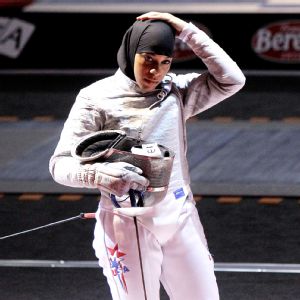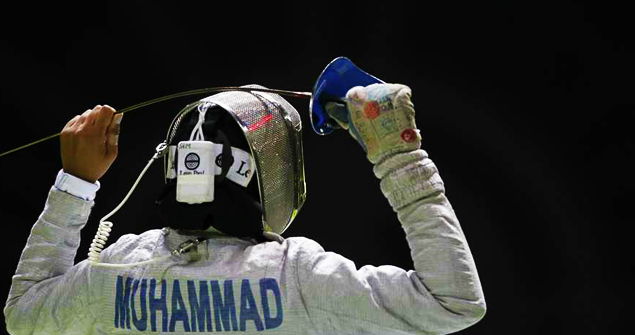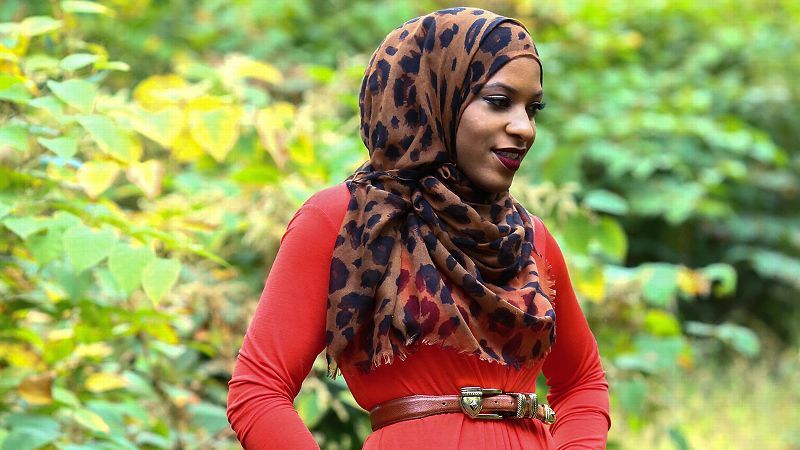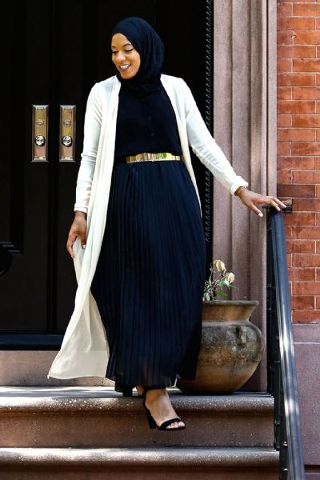Fencing is a sport few know about—so it comes to a surprise that African Americans are interested in the sport.
“A lot of people say fencing is a physical chess,” says Muhammad of the sport.
Muhammad, who is a Muslim, is recognized most for proudly wearing her head wrap, or as some would call a hijab.
Found out more about this amazing woman in the below video clip.
>via: http://blacktimetravel.com/meet-ibtihaj-muhammad-first-black-woman-fencer/
_____________________________
Ibtihaj Muhammad
– USA Fencing Team
Joshua Salaam interviews Ibtihaj Muhammad, a world-champion fencer on the USA Fencing team about her career, sports and her clothing line “Louella by Ibtihaj Muhammad.
_____________________________
FOR THIS
OLYMPIC HOPEFUL,
THE ROAD TO RIO
IS PAVED WITH
FENCING AND FASHION
When Ibtihaj Muhammad pulls on her white knickers, knee-high socks, metal jacket and bulky mask at the fencing world championships in Moscow this week, she will have one goal: Help the U.S. defend its 2014 gold medal in the women’s team sabre event.
But the prizes weren’t what initially attracted the world’s 15th-ranked swordswoman to the sport. It was the uniform. When Muhammad was 13, her mother drove past a school, and seeing athletes training in full-body gear, told Ibtihaj (the third of five athletic children): “I don’t know what that is, but you’re doing it.”
Unlike basketball tank tops and volleyball shorts, the head-to-toe fencing outfits were perfect for a Jersey girl from a Muslim family whose faith required her to cover her arms, legs, head and neck.
Finding something to wear off the fencing strip, however, was a different story. Two winters ago, a futile online search for a chic and affordable long-sleeved dress led the 29-year-old Duke University graduate to another career — in fashion.
In May 2014, Muhammad and her siblings launched a women’s clothing company called Louella — a fresh twist on what other 2016 U.S. Olympic hopefuls are doing in the industry. Unlike the custom-made, hip-baring couture with plunging necklines that 800-meter runner Maggie Vessey creates to compete in, or the cutting-edge casual wear that Serena Williams designed for New York Fashion Week last year, Louella’s 60 pieces include flowing tunics, floor-length dresses and lightweight calf-skimming cardigans made in the U.S. — almost all priced under $100 dollars and machine washable — for those who value dressing modestly.
Muhammad thinks there is clearly a demand for it. “If you ask any woman who has to cover her arms and legs, the majority are buying things at Forever 21, H&M, Lord & Taylor, Macy’s or whatever, but doing a lot of layering,” she says. “You’re taking a maxi dress and throwing a shirt on underneath, or a sweater over it. That just becomes super-costly. Also, it’s really hot.
“I also feel like I’m always ordering from overseas. Of course, there are Muslim companies here in the States, but they never have things that I would like to wear. A lot of the clothes are a bit matronly.”
Data also supports Muhammad’s idea, showing that there is a rapidly growing market for conservative clothing. According to the most recent Thomson Reuters report on the State of the Global Islamic Economy, Muslim consumers spent $22 billion dollars in 2012 on clothing and footwear in North America and Western Europe alone. In 2013, global expenditure was $266 billion, and rising. By 2019, Thomson Reuters estimates the market will reach $484 billion (or 14.4% of worldwide spending on apparel and footwear).
But Louella is not only selling to Muslim women.
“I can’t tell you how many emails I get that say, ‘I love your dresses. I’m not Muslim. Can I buy one?'” Muhammad says. “There’s no clause on the website that says if you’re not Muslim, you can’t. We want to appeal to women who want to dress modestly and practice no particular faith.”
And at this point, the biggest challenge is keeping up with demand. “As quickly as we post something on the site, it sells out. It’s a good problem to have, for sure.”
Last winter, Louella had 52 items in the catalog and had sold an estimated 3,000 pieces online in its first six months. By the end of its first year, Louella had generated almost $250,000 in sales.
“The majority of our customers purchase more than once,” says Qareeb Muhammad, Ibtihaj’s older brother, who handles operations in Los Angeles — the location of the company’s five manufacturing facilities. The sisters remain on the East Coast, selecting fabrics and designs while maintaining the website and boxing up orders once they arrive at the warehouse in Maplewood, New Jersey.
To expand its customer base, Louella had its first pop-up shop in Detroit last summer during a four-day convention hosted by the Islamic Society of North America (ISNA).
“It was awesome — 20,000 people came through from Friday to Monday,” Muhammad says. “We sold a ton, so a lot of the women had the dresses on. We also got hot pink shopping bags with our logo on the side, and by the end of the conference it seemed like every woman had this bag, which was kind of cool.”
There were two more pop-up stores this spring, in New York and Washington, D.C., and there are plans to hit Chicago over Labor Day weekend.
So far, Louella has not had any big-name celebrity clients or endorsements, but Qareeb said the dream would be to see First Lady Michelle Obama or Malala Yousafzai, the 18-year-old Pakistani Nobel Peace Prize winner, wearing the brand.

Ibtihaj Muhammad
Age: 29
Height: 5’7″
Weight: 145 pounds
Current U.S. Ranking: No. 3
Current World Ranking: No. 15
At its core, however, Louella is a family brand and the catalog fully reflects it, starting with its namesake. Louella was their paternal grandmother who died in 2010. “One of my biggest supporters,” Muhammad says.
In addition, the 26 dresses online are all named after family members: Faizah is their youngest sister — at 23, she is also a world-class fencer; Inayah is their mother (a public schoolteacher who also goes by Denise); Dorothy is their maternal grandmother; Diana, an aunt, is the company’s original investor; and Lulu (an earlier design), is a great-grandmother on their father’s side.
On the website, the three youngest sisters (Ibtihaj, Asiya, and Faizah) model most of the clothing — sometimes reluctantly — along with a few friends and professional models.
“I don’t like modeling at all, so I force it on Faizah,” Ibtihaj jokes. “I don’t think she likes it that much, but it’s tough when you’re pretty, I’m sure.”
Meanwhile Muhammad, who graduated from college in 2007 with a double major in international relations and African-American studies (and a minor in Arabic), is working overtime to make her two professions mesh: “I enjoy the challenge of fencing and running a business. For me, I need something else; I don’t want to be in a fencing gym 24/7. It’s a great reprieve.”
But sometimes the two careers nearly collide. Last December, five days before competing in a major international event in New York City, Muhammad noticed that a seamstress had attached the clothing hang tags wrong, so she stayed up until 2 a.m. fixing the mistakes.
“I’m sure our customers probably wouldn’t notice, but I know,” she says. “No way am I going to sell it like this, so I went through every dress untying the ribbon, flipping the card over, re-tying it, re-packaging it and putting the size label on the outside of the packages. I timed it. It took 30 seconds per dress.” But it was 480 dresses, so at minimum, that meant four hours of nonstop work.
“Even the small things have to be done right to be successful,” she says. “I want to give the best products so people come back. It’s really rewarding to know that we’ve only had 20 returns in our first 700 online orders.”
Given the time commitment, though, was it wise starting a business so close to the Olympics?
Teammate Mariel Zagunis, a two-time Olympic sabre gold medalist (2004, 2008), has complicated feelings. On one hand, she personally avoids all non-fencing distractions, “because then I know I’ve given it 100% and I can feel confident on the [fencing] strip. That’s just my personality.”
But Zagunis thinks the split focus works for Muhammad. “I don’t think it’s crazy at all,” she says. “It takes a very ambitious person, and I can see she’s definitely working very hard. At competitions, she is filling orders, working on the website, answering emails and all that stuff required to run a business. I’m happy for her that it’s paying off.”
Eliza Stone, another sabre fencer who helped the U.S. win the women’s team gold at the 2014 World Championships, works at a chemistry lab at her alma mater (Princeton University) when she’s not training, and she’s on her entrepreneurial teammate’s side.
“Having only training is too much pressure,” Stone explains. ” When your life is fencing, every win, every [loss] either makes your life or shatters it. You have to have something else to balance you out and escape. For me and probably for Ibti, having a job will make us perform better.”







Great article. I was not even aware we had a sister puttin in work in the fencing world.